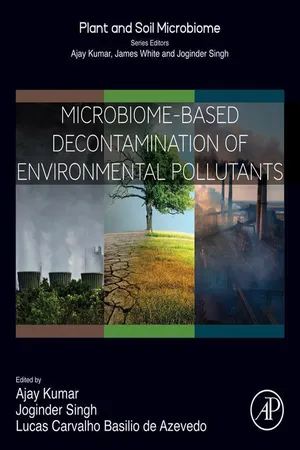
Microbiome-Based Decontamination of Environmental Pollutants
- 400 pages
- English
- ePUB (mobile friendly)
- Available on iOS & Android
Microbiome-Based Decontamination of Environmental Pollutants
About This Book
Microbiome-Based Decontamination of Environmental Pollutants explores the complex interactions of plant-associated microbiomes, providing insights into the pressing challenges of managing environmental resources such as soil, water, and waste. Analysis has shown a formidable potential based in the network interactions between plant microbiota and environmental contaminants. This book presents insights into the potential exploitation of these plant-associated microbial functions. This volume in the Plant and Soil Microbiome series summarizes microbiological aspects of environmental management from the basics to advanced theoretical as well as practical aspects of microbial-based approaches. The physical and chemical changes caused by pollution of an ecosystem can occur rapidly, significantly impacting the functionality of ecosystem services in that environment. Environmental contamination poses and increasingly global challenge through direct and indirect adverse impacts on the climate, soil productivity and the health concerns of human beings. Traditional remediation techniques are not consistently feasible in mitigating environmental contaminants challenges in terms of cost-effectiveness, limited land resources and toxic residual products. The use of plant-associated microbes as part of a network of tools opens a new door to explore an alternative, eco-friendly and economical technology to mitigate the challenges of environmental contamination.
- Explores the emerging plant microbe interactive nexus for contaminants degradation
- Presents insights into the production and commercialization of plant-microbiome based enzymes
- Includes engineered microbes and microbial products application in contaminant management
- Highlights the latest omics and technologies used in plant–soil microbiome in contaminant management
Frequently asked questions
Information
Table of contents
- Cover image
- Title page
- Table of Contents
- Copyright
- List of contributors
- About the editors
- Chapter 1. Impact of nanotoxicity in soil microbiome and its remedial approach
- Chapter 2. Nanomaterial mediated wastewater treatment: a new frontier in environmental remediation
- Chapter 3. Microbiome immobilized sorbents: status and future aspects
- Chapter 4. Importance of microbial surfactants in heavy metal remediation
- Chapter 5. Environmental contamination management using endophytic microorganisms
- Chapter 6. Deciphering microbe-driven remediation of environmental pollutants: an omics perspective
- Chapter 7. Mycobial nanotechnology in bioremediation of wastewater
- Chapter 8. Bioremediation of high-molecular-weight polycyclic aromatic hydrocarbons: an insight into state of art and cutting-edge approaches
- Chapter 9. Microbial enzymes in biodegradation of organic pollutants: mechanisms and applications
- Chapter 10. Microbial indicators for monitoring pollution and bioremediation
- Chapter 11. Microbial bioremediation of metal and radionuclides: approaches and advancement
- Chapter 12. Microbial bioremediation of metal and radionuclides: approaches and advancement
- Chapter 13. Microbe-assisted remediation of xenobiotics: a sustainable solution
- Chapter 14. Microbe-assisted remediation: a sustainable solution to herbicide contamination
- Chapter 15. Microbial synthesized nanoparticles in environment management
- Chapter 16. Perspectives of probiotics in the next-generation sequencing era
- Chapter 17. Biopesticides versus synthetic pesticides usage in Africa
- Index